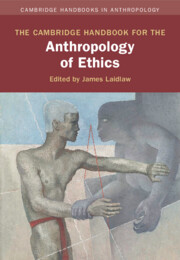Book contents
- The Cambridge Handbook for the Anthropology of Ethics
- Cambridge Handbooks in Anthropology
- The Cambridge Handbook for the Anthropology of Ethics
- Copyright page
- Contents
- Contributors
- 1 Introduction
- Part I Intellectual Sources and Disciplinary Engagements
- 2 Moral and Political Philosophy
- 3 Virtue Ethics
- 4 Agonistic Pluralists
- 5 The Two Faces of Michel Foucault
- 6 Phenomenology
- 7 Cognitive Science
- 8 Theology
- Part II Aspects of Ethical Agency
- Part III Media and Modes of Ethical Practice
- Part IV Intimate and Everyday Life
- Part V Institutional Life
- Index
- References
6 - Phenomenology
from Part I - Intellectual Sources and Disciplinary Engagements
Published online by Cambridge University Press: 11 May 2023
- The Cambridge Handbook for the Anthropology of Ethics
- Cambridge Handbooks in Anthropology
- The Cambridge Handbook for the Anthropology of Ethics
- Copyright page
- Contents
- Contributors
- 1 Introduction
- Part I Intellectual Sources and Disciplinary Engagements
- 2 Moral and Political Philosophy
- 3 Virtue Ethics
- 4 Agonistic Pluralists
- 5 The Two Faces of Michel Foucault
- 6 Phenomenology
- 7 Cognitive Science
- 8 Theology
- Part II Aspects of Ethical Agency
- Part III Media and Modes of Ethical Practice
- Part IV Intimate and Everyday Life
- Part V Institutional Life
- Index
- References
Summary
This chapter surveys the (relatively limited) place of philosophical ethics in the development of phenomenology, and the problematical legacy of Heidegger’s thought, specifically, for phenomenological engagement with ethics. It discusses divergent interpretations of Heidegger in both philosophy and anthropology, and different anthropological versions of a phenomenology of ethics. It also considers the distinctive approach to ethics, building instead of Heidegger on Husserl’s unpublished lectures on ethics, in the study of values.
- Type
- Chapter
- Information
- The Cambridge Handbook for the Anthropology of Ethics , pp. 155 - 176Publisher: Cambridge University PressPrint publication year: 2023

